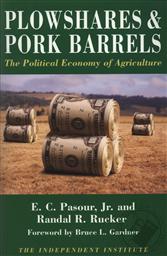Plowshares & Pork Barrels: The Political Economy of Agriculture (Book/ Paperback)
by E.C. Pasour Jr., Randall R. Rucker , Bruce L. GardnerProduct Overview
Agricultural subsidies in grains, cotton, milk, sugar, tobacco, honey, wool, and peanuts are analyzed in this examination of U.S. farm policy. Looking at such programs as food stamps, crop insurance, subsidized credit, trade credit, trade subsidies and import restrictions, conservation, agricultural research, and taxation, this historical perspective argues that these subsidies ultimately redistribute wealth to powerful agricultural interests who use their political clout to advance their economic interests at the expense of the general public. This analysis of government farm programs will appeal to professors and students who study agriculture; people affected by government farm policies; public officials, and businesses affected by agricultural policy such as those in food service, retail, and distribution.
Detailed Description
The United States Department of Agriculture was created in 1862 as an information agency for farmers. Its establishment laid the foundation for widespread government intervention in agriculture. Until the 1930s, however, government played a limited role in agricultural markets, primarily one of emphasizing ways to increase the productivity of crop and livestock producers. This changed dramatically in the 1930s under the Roosevelt New Deal, with the enactment of a multitude of farm programs to regulate the production and marketing of agricultural products.
Agricultural subsidies have expanded ever since, and farmers have remained among the country’s most effective special-interest groups. In the 1980s, the Reagan Revolution (despite the deregulation rhetoric) made not one dent in America’s farm and food programs. Some industry observers and participants thought the 1996 farm bill would initiate a new era of reduced government involvement, but the farm lobby won emergency ad hoc relief each year from 1998 through 2001. And the 2002 farm bill, which reversed some of the 1996 changes, makes government involvement in U.S. agriculture likely to continue into the foreseeable future.
Economists frequently criticize this complex, wasteful, and durable web of policies. For example, subsidies for not growing crops are so notorious that they have been the object of biting political satire since their introduction in the 1930s. Other programs periodically make headlines, typically when treasury costs get large. Yet surprisingly, attempts to undertake comprehensive critical analyses of U.S. farm and food programs are rare.
In Plowshares & Pork Barrels: The Political Economy of Agriculture, E. C. Pasour, Jr. and Randal R. Rucker lucidly scrutinize U.S. agricultural policy in its entirety. “What makes Pasour and Rucker’s approach particularly valuable, is not only the facts presented and analytical findings but even more the line of argument in which it is embedded,” writes Bruce L. Gardner in the book’s foreword.
The Politics of Agriculture
The book consists of twenty chapters. Chapters 1 to 7 focus on the public-policy process, addressing questions such as: What is the role of economics and the economist in public-policy analysis? What is the origin of the network of programs affecting U.S. agriculture? Who gains and who loses from farm and food programs? Why have farm programs persisted long after the nation recovered from the ruinous conditions of the 1930s that precipitated the implementation of the programs?
Plowshares & Pork Barrels compares and contrasts the market process with the political process. Chapters 4 and 5, which are devoted to public-choice theory, show how economic principles can be used to explain decision-making in the political process. There is, for example, an overspending bias in agricultural policy because of the separation of power and responsibility by elected and appointed public officials who formulate, administer, and evaluate farm programs. There is also a bias toward programs involving investments with near-term benefits and distant costs.
Are farm programs driven m
About the Author(s)
E.C. Pasour Jr., Randall R. Rucker , Bruce L. Gardner
List Price: $22.95
Our Price: $17.95
You Save:
$5.00(22%)
+ Free Shipping w/ $45 min. purchase
Category: Business & Economics
Format: Book (Paperback) (368)
Publisher: Independent Studies Institute
Date Published: Sep 01, 2005
Language: English
ISBN: 9780945999034
SKU: LT-2057
Dimensions: 6.00 x 9.00 x 0.75 (in)
Weight: 19.20 oz










